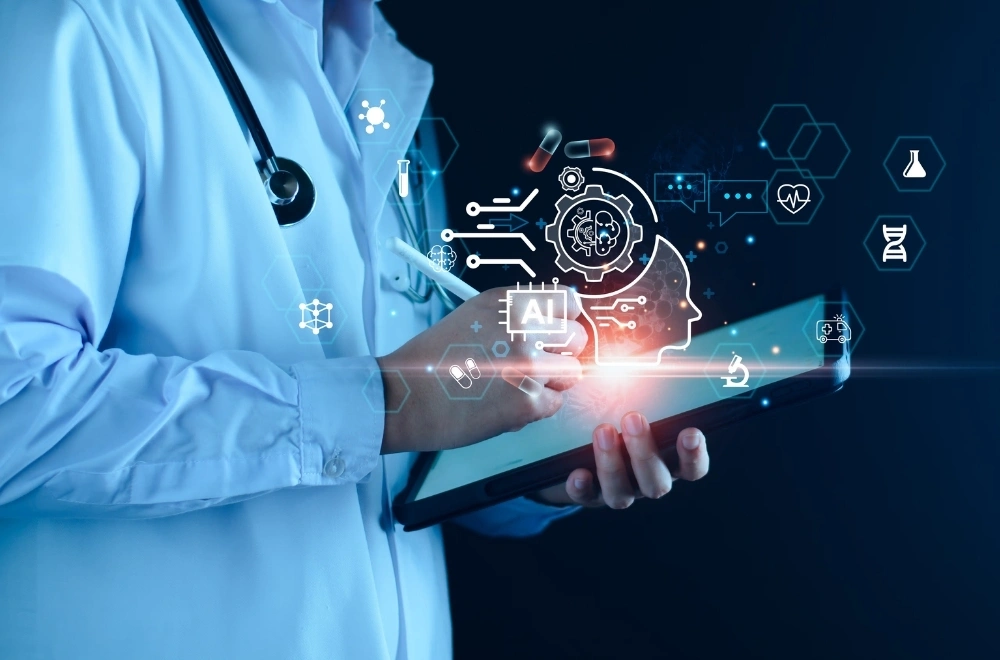Introduction
The healthcare industry is undergoing a transformative shift, thanks to advancements in artificial intelligence (AI) and deep learning. Deep learning, a subset of machine learning, leverages neural networks with multiple layers to analyze vast amounts of data, recognize patterns, and make predictions with remarkable accuracy. In healthcare, this technology is being applied to improve diagnostics, personalize treatment plans, streamline administrative processes, and accelerate drug discovery.
From early disease detection to robotic surgery, deep learning is enhancing medical outcomes while reducing costs and inefficiencies. This article explores the key areas where deep learning is making an impact, the challenges it faces, and its future potential in revolutionizing healthcare.
1. Medical Imaging and Diagnostics
One of the most significant applications of deep learning in healthcare is in medical imaging. Traditional diagnostic methods rely on radiologists and pathologists to interpret X-rays, MRIs, CT scans, and biopsies. However, human interpretation can be time-consuming and prone to errors.
a. Radiology and Image Analysis
Deep learning models, particularly convolutional neural networks (CNNs), excel at analyzing medical images. These models can detect anomalies such as tumors, fractures, and hemorrhages with high precision.
- Cancer Detection: AI-powered systems like Google’s DeepMind and IBM Watson can identify breast cancer, lung cancer, and skin melanoma from imaging data, often outperforming human radiologists in accuracy.
- Brain Imaging: Deep learning helps in detecting brain disorders such as Alzheimer’s, Parkinson’s, and strokes by analyzing MRI and CT scans.
- Retinal Diseases: AI models like IDx-DR (FDA-approved) can diagnose diabetic retinopathy by scanning retinal images, enabling early intervention.
b. Pathology and Microscopy
Pathologists examine tissue samples under microscopes to detect diseases. Deep learning automates this process by identifying cancerous cells in biopsy slides.
- Companies like PathAI use AI to improve pathology assessments, reducing diagnostic errors.
- AI models can also predict disease progression based on cellular patterns.
2. Personalized Medicine and Treatment Optimization
Deep learning enables precision medicine by analyzing patient data—genetic, lifestyle, and clinical history—to recommend tailored treatments.
a. Genomic Medicine
AI algorithms analyze genetic sequences to identify mutations linked to diseases like cancer, cystic fibrosis, and rare genetic disorders.
- DeepVariant by Google uses deep learning to detect genetic mutations more accurately than traditional methods.
- AI-driven platforms help oncologists select the best chemotherapy drugs based on a patient’s genetic profile.
b. Predictive Analytics for Chronic Diseases
Machine learning models predict disease risks by analyzing electronic health records (EHRs).
- Diabetes Management: AI tools like IBM’s Watson Health predict blood sugar fluctuations and recommend insulin dosages.
- Cardiovascular Risk Prediction: Deep learning models analyze ECG and echocardiogram data to forecast heart attacks and strokes.
3. Drug Discovery and Development
Traditional drug discovery is expensive and time-consuming, often taking over a decade and billions of dollars. Deep learning accelerates this process by predicting drug interactions and optimizing clinical trials.
a. Virtual Screening and Drug Repurposing
AI models analyze molecular structures to identify potential drug candidates.
- AlphaFold by DeepMind predicts protein folding, aiding in drug design.
- BenevolentAI uses deep learning to repurpose existing drugs for new treatments, such as identifying baricitinib for COVID-19.
b. Clinical Trial Optimization
AI helps in patient recruitment, monitoring adverse effects, and predicting trial success rates.
- Companies like Saama Technologies use AI to streamline clinical data analysis.
4. Robotic Surgery and Assistive Technologies
AI-powered robotic systems enhance surgical precision, reducing human error.
a. Surgical Robots
- Da Vinci Surgical System uses AI to assist surgeons in minimally invasive procedures.
- Deep learning algorithms provide real-time guidance during operations.
b. Rehabilitation and Prosthetics
AI-driven prosthetics adapt to users’ movements using neural signals.
- Companies like Open Bionics develop AI-powered bionic limbs.
5. Healthcare Administration and Workflow Optimization
Deep learning improves hospital operations by automating administrative tasks.
a. Electronic Health Records (EHR) Management
- NLP models extract insights from unstructured clinical notes.
- AI reduces documentation burdens on doctors.
b. Fraud Detection and Billing
AI detects insurance fraud and coding errors in billing.
Challenges and Ethical Considerations
Despite its potential, deep learning in healthcare faces challenges:
- Data Privacy: Ensuring patient data security under regulations like HIPAA and GDPR.
- Bias in AI Models: Training data must be diverse to avoid biased diagnostics.
- Regulatory Hurdles: FDA approval for AI-based medical devices is stringent.
- Interpretability: Many deep learning models are “black boxes,” making it hard to trust their decisions.
The Future of Deep Learning in Healthcare
The integration of AI in healthcare will continue to grow, with advancements in:
- Federated Learning: Allowing hospitals to collaborate on AI models without sharing raw data.
- AI-Powered Wearables: Continuous health monitoring via smartwatches and biosensors.
- Telemedicine Enhancements: AI-driven chatbots for preliminary diagnoses.
Conclusion
Deep learning is revolutionizing healthcare by improving diagnostics, enabling personalized treatments, accelerating drug discovery, and optimizing hospital workflows. While challenges remain, the potential benefits—earlier disease detection, reduced costs, and better patient outcomes—make AI an indispensable tool in modern medicine. As technology evolves, deep learning will play an even greater role in shaping the future of healthcare.
